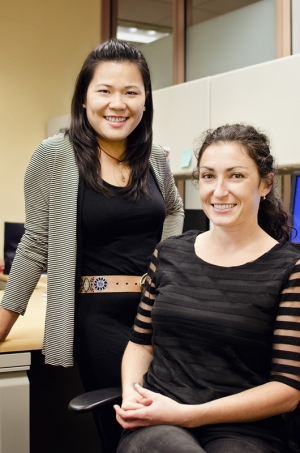Scholars to Explore Child Maltreatment in Select Neighborhoods
November 18, 2014 / by Eric Lindberg- Research
How do unique neighborhood characteristics influence rates of child maltreatment?
A new study led by researchers at the USC School of Social Work will explore that question, particularly how social dynamics in immigrant enclaves and collaboration among community service providers may protect against or increase the risk of child abuse and neglect.
Previous studies have largely focused on individual and family factors that might influence maltreatment, but researchers at the USC School of Social Work are widening that perspective to examine specific geographic areas in Southern California with child maltreatment rates that are higher or lower than expected.
Although the two-year project builds on a current effort by Assistant Professor Michael Hurlburt to explore variations in maltreatment at the neighborhood level in San Diego County, it will essentially allow doctoral candidates Megan Finno-Velasquez and Amy He to advance their personal research interests.
“This is allowing Amy and Megan to finish their dissertations and to develop additional skills and expertise that will strengthen their transitions into faculty positions,” Hurlburt said. “This grant is designed to develop outstanding scholars who will be the next generation of professional leaders in the field.”
Immigration and collaboration
Finno-Velasquez will focus on how cultural and social factors related to the immigrant experience may increase or decrease instances of child abuse or neglect, whereas He is interested in exploring the role of interactions and partnerships among child welfare service providers in preventing maltreatment.
Both students said the funding, approximately $200,000 from the federal Children’s Bureau, will help them advance their dissertations, which involve analyzing secondary data from a national study, and build valuable research skills in terms of collecting primary data in the community. It will also offer opportunities to other master’s and doctoral students interested in research.
“It has built-in funding for doctoral research assistants to help with a lot of the data collection and management,” Finno-Velasquez said. “It also adds a training component for master’s students to have hands-on experience in their research methods classes. They will hopefully be going out and collecting some of the surveys with us.”
She plans to ask specific questions during interviews and surveys with service providers and community members geared toward understanding how both negative and positive social dynamics, such as strong family support networks, social isolation, and fear or mistrust of government, may affect child maltreatment rates in areas with high concentrations of Latino immigrants.
“What might be preventing them from coming forth when they need assistance?” she said. “Do they have difficulty understanding the laws here?”
Unique challenges
For example, He recalled a recent conversation with a colleague who works as an emergency response supervisor regarding a specific Los Angeles neighborhood with a high concentration of low-income Guatemalan immigrants.
Rates of maltreatment in that community are notoriously high, she said, and agencies are experiencing difficulty providing services due to language barriers and other issues.
“For some reason, the domestic violence in these families is really intense,” He said. “Housing is also an issue because one person may rent out an apartment to three different families.”
Developing strategies to improve access and use of services in that type of situation is a good fit with He’s general research interests and her dissertation, which is focused on interagency collaboration among service providers. She is looking forward to interviewing providers to determine if any preventive efforts are being made across organizations.
“I’m interested in not just intervention but also primary prevention with respect to helping communities so that child maltreatment is prevented from occurring in the first place and families are able to access services before they come to the attention of child welfare,” she said.
Long-term goals
This funding, including the original support from a social innovations grant from the USC Price School of Public Policy and the new grant, will allow the researchers to test specific hypotheses about characteristics of communities that may lead to unusual rates of maltreatment referrals and conduct exploratory research via qualitative interviews.
The research team is hopeful that results from this work will guide ongoing efforts to design community-level intervention strategies that can reduce local rates of maltreatment. The team is already building partnerships with agencies in San Diego, including a nonprofit organization in San Diego County that owns more than 30 affordable housing properties.
“Over time, we’re hoping that those collaborations will serve as ongoing venues for trying out ideas for prevention that come from the work we are doing,” Hurlburt said.
The researchers will also share their findings with community stakeholders during planned meetings and via the school’s Child Development and Children’s Services research cluster and Children’s Data Network.
Building a foundation
Both doctoral candidates said the experience may give them an edge once they complete their dissertations and begin searching for faculty positions, particularly because they will have engaged in community-level research.
“This grant allows me to go out and collect data and talk to people about what is actually happening,” He said. “It’s a really great complement to my dissertation, and in terms of my research agenda, it creates a much more rounded profile for me coming out of USC.”
Finno-Velasquez agreed, noting that although analyzing a large dataset as part of her dissertation will be respected, she now has the opportunity to begin building relationships with service providers and stakeholders that may lead to new studies.
“It’s definitely a jump start for future research,” she said.
To reference the work of our faculty online, we ask that you directly quote their work where possible and attribute it to "FACULTY NAME, a professor in the USC Suzanne Dworak-Peck School of Social Work” (LINK: https://dworakpeck.usc.edu)
